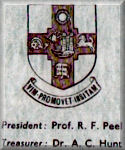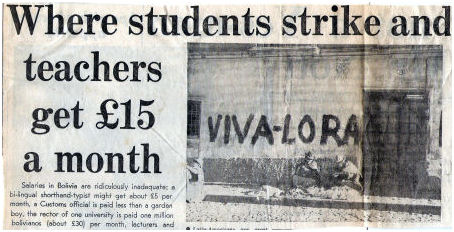University
of Bristol Trans-Continental Expedition 1960 — 61 | ||||||||
| ||||||||
| published 5 July 1961 | ||||||||
Salaries in Bolivia are ridiculously inadequate; a bi-lingual shorthand-typist might get about £5 per month, a Customs official is paid less than a garden boy, the rector of one university is paid one million bolivianos (about £30) per month, lecturers and teachers get half that or less and must do two jobs to earn a reasonable living. Under these circumstances it is difficult to get the best people for the official positions, and there is a tendency to eke out the salary with "private charges" for work done officially. The Sindicato (union) officials are frequently petty politicians prepared to make endless trouble for personal aggrandisement or enrichment. They are the leaders rather than the representatives of the workers, often having no experience in the crafts of their followers. The large majority of the miners' leaders are surface workers, before the revolution they were not miners, nor have any experience of underground work. The Sindicatos have embraced wholeheartedly the principle of withholding labour, and strikes are frequent. Some are understandable - the long distance lorry drivers struck as a protest against the condition of the roads, for example; but many are destructive and impede progress - the Sindicato of sail ferry operatives on Lake Titicaca went on strike when there was a proposition to introduce motor-powered vessels … sailing boats are still used. Rioting Some are incomprehensible; the municipal worker of La Paz once went on strike to show their support for the Government - surely their purpose could have been better served by a simple expression of satisfaction and a continuity of service? This form of action is not restricted to the workers, students often use it - particularly High School students, who rebel against conditions in their schools, or the length of holidays, or what-have-you. One celebrated fortnight of riots began with such a demonstration. The High School students professed a grudge against the municipal offices and the Ministry of Education: eventually the police went into action with tear-gas to break them up. Annoyed This was barely over when a large section of the population took exception to an article on Bolivia written in an American weekly. This concerned the aid given to Bolivia and its use - or misuse. Large mobs gathered outside the American Embassy and Ambassadors residence and during the unpleasant scenes many more windows were broken. Then came the abortive attempt to invade Cuba and really serious riots were a great danger. All Europeans were requested by their embassies to remain indoors and for some time the situation was very ugly. A building site near the troubles was completely denuded of bricks, broken pieces of concrete and other useful missiles, thus prejudicing the building programme which was already suffering somewhat from inertia. Now a policeman stands permanent guard at the gate of the yard to prevent any further depletion of the stores. Mob rule But Bolivia is a land of vice-versa and both sides of the picture can often be seen. Around four months ago a Russian delegation came to discuss possible assistance; a mob marched straight from Mass at the Cathedral and smashed all the windows at their hotel. Incidentally, there is no Cuban Ambassador in La Paz. He was declared persona non grata due to his recent political activities. The Government have accused the Cuban revolutionaries of conspiring to overthrow the present system. Following the movement against the alleged coupthe miners declared a strike on behalf of their arrested left-wing leaders but reports suggest this is now under control. The Government is making great efforts to regularise the mines. Part of a large loan now being negotiated will be used to pension off redundant workers and the rest will then be used to improve machinery and place the industry on an economic footing. Conflict It is essential that loans to not continue to ' leak away ' unprofitably. Bolivia as received 21 per cent of the total aid to Latin America, and, in truth, has little to show for it. But they are signs of better planning of its use in the future and the Kennedy administration appears to be demanding an attempt to promote internal stability as a pre-requisite before considering further help to Latin American countries. This account paints a gloomy picture and Bolivia certainly has most of the problems that could confront a country today. Earlier articles have attempted to show the great possibilities in Bolivia, and, once again, one can only say that it is a question of timing. Many of the Government's policies are extremely well-intentioned and undoubtedly it still has support. But do the people yet realise what such support could entail. Probably many of the troubles have come from the attempt o do too much too quickly. But many of the reforms inaugurated, and half carried out, were essential, the trouble has been a conflict of priorities. And, regrettably, there has been some desire in official circles for personal kudos which tends to inhibit the very necessary co-operation between departments. Damaging The Bolivian National Revolution of 1952 was hailed as a non-Communist revolution, a sincere attempt to alleviate much of the social distress and injustice without resorting to a Communist framework. As such it received support. Its most damaging legacy from the old days is the vast population of Indians, withdrawn, uneducated, non-consumers, whose inbred suspicion of any rulers is only slowly being overcome. It is something of a race: education could produce the kind of citizen the country needs, but education takes time. And time cannot be bought with foreign aid. | ||||||||
|


 Low
pay in La Paz
Low
pay in La Paz